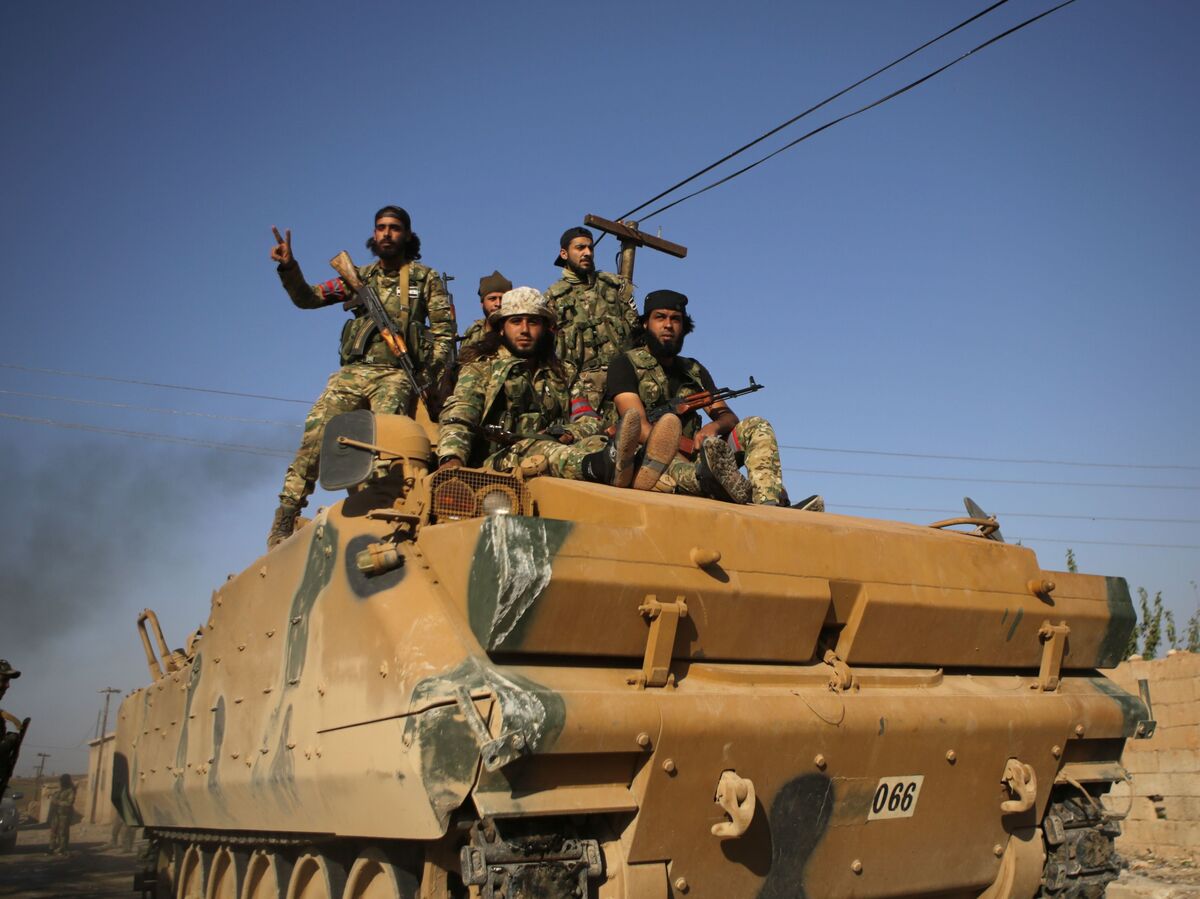
Turkey-backed Syrian fighters sit atop an armored personnel carrier in the southwestern neighborhoods of the border Syrian town of Tal Abyad on Sunday. The U.S. plans to evacuate its troops from northern Syria amid the Turkish offensive.
Bakr Alkasem/AFP via Getty Images
hide caption
toggle caption
Bakr Alkasem/AFP via Getty Images
Turkey-backed Syrian fighters sit atop an armored personnel carrier in the southwestern neighborhoods of the border Syrian town of Tal Abyad on Sunday. The U.S. plans to evacuate its troops from northern Syria amid the Turkish offensive.
Bakr Alkasem/AFP via Getty Images
Updated at 6:49 p.m. ET
All U.S. forces involved in the anti-ISIS fight will withdraw from northeast Syria in the coming days, according to two U.S. officials close to the conflict. Only a small garrison of U.S. troops will remain at al-Tanf near Syria’s border with Iraq and Jordan.
The troops in border areas are endangered by Turkey’s incursion against Kurdish-led forces. The move is a sudden change in policy by the Trump administration.
“We’re preparing, waiting for the order,” a U.S. official close to the troops on the ground told NPR in an email. The situation is “getting untenable. Hundreds of ISIS getting free and we’re stuck between two fighting forces.”
Turkey’s rapid military offensive has put U.S. troops in significant danger. U.S. forces now have limited ability to move across northeast Syria without coming into contact with proxy fighters, many of whom are former members of ISIS and Al Qaeda, the official said. Turkey has reportedly provided the militants with armored vehicles that allow them to move quickly.
There are reports that gunfire from Turkish-backed forces has landed very close to the American forces in the region. U.S. Secretary of Defense Mark Esper would not speculate on whether the gunfire was intentional or accidental.
“We need to sort that out,” Esper said in an interview that aired Sunday morning on CBS’s Face The Nation. “We’ve given them the locations of our forces. But look, I’ve been to war. I know what war’s like. There’s a fog out there and things happen and we want to make sure we don’t put our soldiers in a situation where they could be killed or injured. … It would be irresponsible for me to keep them in that position.”
Esper said that the U.S. is preparing to evacuate U.S. troops from northern Syria. “It’ll be a deliberate withdrawal and we want to conduct it as safely and quickly as possible,” he said. “We want to make sure we de-conflict a pullback of forces. We want to make sure we don’t leave equipment behind. So I’m not prepared to put a timeline on it, but that’s our general game plan.”
In the CBS interview, Esper suggested that 1,000 troops in northern Syria will be withdrawn.
A U.S. official told NPR that the withdrawal is not as sudden as it appears. “We didn’t just wake up today and see Secretary Esper say something and start ordering up cardboard boxes and duct tape. This has been preplanned for many months,” the official said, adding that the movement has already begun and would take days.
Esper said Turkey has more than 15,000 forces involved in its offensive against the Kurds, while the U.S. had fewer than 50 troops in the immediate area of attack.
The Syrian Observatory for Human Rights, a monitoring group, says that 52 civilians have been killed since the Turkish offensive began on Wednesday. Esper said that it appears that Turkish proxy forces have committed war crimes.
President Trump has come under significant criticism by both Democrats and Republicans, who say that the U.S. has abandoned the Kurdish-led forces who have been a key ally in the fight against ISIS.
Susan Rice, former national security adviser in the Obama administration, told NPR’s Sacha Pfeiffer on Sunday’s All Things Considered that the Trump administration’s decision to withdraw troops from northern Syria is “nothing short of a self-inflicted catastrophe.”
Rice warned that absent the pressure of U.S. forces, ISIS will be able to “rejuvenate and reconstitute itself.”
In response to people who agree with Trump’s position to end U.S. involvement in “endless wars,” Rice said the American role in the Syrian conflict can’t be compared to the ground wars in Iraq and Afghanistan. “It was not a war that was costly in terms of casualties for the United States or in terms of resources.”
“Now, because of this withdrawal, all that work, all that investment is going to be at risk of loss,” she said. “There’ll be a humanitarian catastrophe for which the United States has blood on its hands. And Russia, Iran, and Assad will be the proximate beneficiaries in addition to the Turks.”
In tweets Sunday morning, Trump wrote that it was “Very smart not to be involved in the intense fighting along the Turkish Border, for a change.”
“The Kurds and Turkey have been fighting for many years,” Trump added. “Others may want to come in and fight for one side or the other. Let them! We are monitoring the situation closely. Endless Wars!”
NPR Pentagon Reporter Tom Bowman and International Correspondent Ruth Sherlock contributed to this report.


